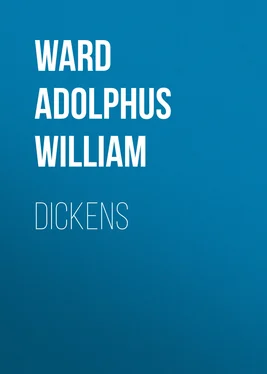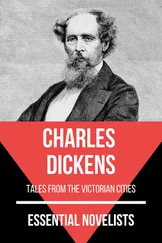Adolphus Ward - Dickens
Здесь есть возможность читать онлайн «Adolphus Ward - Dickens» — ознакомительный отрывок электронной книги совершенно бесплатно, а после прочтения отрывка купить полную версию. В некоторых случаях можно слушать аудио, скачать через торрент в формате fb2 и присутствует краткое содержание. Жанр: Биографии и Мемуары, foreign_antique, на английском языке. Описание произведения, (предисловие) а так же отзывы посетителей доступны на портале библиотеки ЛибКат.
- Название:Dickens
- Автор:
- Жанр:
- Год:неизвестен
- ISBN:нет данных
- Рейтинг книги:5 / 5. Голосов: 1
-
Избранное:Добавить в избранное
- Отзывы:
-
Ваша оценка:
- 100
- 1
- 2
- 3
- 4
- 5
Dickens: краткое содержание, описание и аннотация
Предлагаем к чтению аннотацию, описание, краткое содержание или предисловие (зависит от того, что написал сам автор книги «Dickens»). Если вы не нашли необходимую информацию о книге — напишите в комментариях, мы постараемся отыскать её.
Dickens — читать онлайн ознакомительный отрывок
Ниже представлен текст книги, разбитый по страницам. Система сохранения места последней прочитанной страницы, позволяет с удобством читать онлайн бесплатно книгу «Dickens», без необходимости каждый раз заново искать на чём Вы остановились. Поставьте закладку, и сможете в любой момент перейти на страницу, на которой закончили чтение.
Интервал:
Закладка:
“‘I take an interest, my lord,’ said Mrs. Wititterly, with a faint smile, ‘such an interest in the drama.’
“‘Ye-es. It’s very interasting,’ replied Lord Frederick.
“‘I’m always ill after Shakspeare,’ said Mrs. Wititterly. ‘I scarcely exist the next day. I find the reaction so very great after a tragedy, my lord, and Shakspeare is such a delicious creature.’
“‘Ye-es,’ replied Lord Frederick. ‘He was a clayver man.’”
But Sir Mulberry Hawk is a kind of scoundrel not frequently met with in polite society; his henchmen Pluck and Pyke have the air of “followers of Don John,” and the enjoyments of the “trainers of young noblemen and gentlemen” at Hampton races, together with the riotous debauch which precedes the catastrophe, seem taken direct from the transpontine stage. The fact is that Dickens was here content to draw his vile seducers and wicked orgies just as commonplace writers had drawn them a thousand times before, and will draw them a thousand times again. Much of the hero’s talk is of the same conventional kind. On the other hand, nothing could be more genuine than the flow of fun in this book, which finds its outlet in the most unexpected channels, but nowhere so resistlessly as in the invertebrate talk of Mrs. Nickleby. For her Forster discovered a literary prototype in a character of Miss Austen’s; but even if Mrs. Nickleby was founded on Miss Bates, in Emma , she left her original far behind. Miss Bates, indeed, is verbose, roundabout, and parenthetic; but the widow never deviates into coherence.
Nicholas Nickleby shows the comic genius of its author in full activity, and should be read with something of the buoyancy of spirit in which it was written, and not with a callousness capable of seeing in so amusing a scamp as Mr. Mantalini one of Dickens’s “monstrous failures.” At the same time this book displays the desire of the author to mould his manner on the old models. The very title has a savour of Smollett about it; the style has more than one reminiscence of him, as well as of Fielding and of Goldsmith; and the general method of the narrative resembles that of our old novelists and their Spanish and French predecessors. Partly for this reason, and partly, no doubt, because of the rapidity with which the story was written, its construction is weaker than is usual even with Dickens’s earlier works. Coincidences are repeatedly employed to help on the action; and the dénoûment , which, besides turning Mr. Squeers into a thief, reveals Ralph Nickleby as the father of Smike, is oppressively complete. As to the practical aim of the novel, the author’s word must be taken for the fact that “Mr. Squeers and his school were faint and feeble pictures of an existing reality, purposely subdued and kept down lest they should be deemed impossible.” The exposure, no doubt, did good in its way, though perhaps Mr. Squeers, in a more or less modified form, has proved a tougher adversary to overcome than Mrs. Gamp.
During these years Dickens was chiefly resident in the modest locality of Doughty Street, whither he had moved his household from the “three rooms,” “three storeys high,” in Furnival’s Inn, early in 1837. It was not till the end of 1839 that he took up his abode, further west, in a house which he came to like best among all his London habitations, in Devonshire Terrace, Regent’s Park. His town life was, however, varied by long rustications at Twickenham and at Petersham, and by sojourns at the sea-side, of which he was a most consistent votary. He is found in various years of his life at Brighton, Dover, and Bonchurch—where he liked his neighbours better than he liked the climate; and in later years, when he had grown accustomed to the Continent, he repeatedly domesticated himself at Boulogne. But already in 1837 he had discovered the little sea-side village, as it then was, which for many years afterwards became his favourite holiday retreat, and of which he would be the genius loci , even if he had not by a special description immortalised Our English Watering-place . Broadstairs—whose afternoon tranquillity even to this day is undisturbed except by the Ethiopians on their tramp from Margate to Ramsgate—and its constant visitor, are thus described in a letter written to an American friend in 1843: “This is a little fishing-place; intensely quiet; built on a cliff, whereon—in the centre of a tiny semicircular bay—our house stands; the sea rolling and dashing under the windows. Seven miles out are the Goodwin Sands (you’ve heard of the Goodwin Sands?), whence floating lights perpetually wink after dark, as if they were carrying on intrigues with the servants. Also there is a big light-house called the North Foreland on a hill beyond the village, a severe parsonic light, which reproves the young and giddy floaters, and stares grimly out upon the sea. Under the cliff are rare good sands, where all the children assemble every morning and throw up impossible fortifications, which the sea throws down again at high-water. Old gentlemen and ancient ladies flirt after their own manner in two reading-rooms and on a great many scattered seats in the open air. Other old gentlemen look all day through telescopes and never see anything. In a bay-window in a one-pair sits, from nine o’clock to one, a gentleman with rather long hair and no neckcloth, who writes and grins as if he thought he were very funny indeed. His name is Boz.”
Not a few houses at Broadstairs may boast of having been at one time or another inhabited by him and his. Of the long-desired Fort House, however, which local perverseness triumphantly points out as the original of Bleak House (no part even of Bleak House was written there, though part of David Copperfield was), he could not obtain possession till 1850. As like Bleak House as it is like Chesney Wold, it stands at the very highest end of the place, looking straight out to sea, over the little harbour and its two colliers, with a pleasant stretch of cornfields leading along the cliff towards the light-house which Dickens promised Lord Carlisle should serve him as a night-light. But in 1837 Dickens was content with narrower quarters. The “long small procession of sons” and daughters had as yet only begun with the birth of his eldest boy. His life was simple and full of work, and occasional sea-side or country quarters, and now and then a brief holiday tour, afforded the necessary refreshment of change. In 1837 he made his first short trip abroad, and in the following year, accompanied by Mr. Hablot Browne, he spent a week of enjoyment in Warwickshire, noting in his Remembrancer : “Stratford; Shakspeare; the birthplace; visitors, scribblers, old woman (query whether she knows what Shakspeare did), etc.” Meanwhile, among his truest home enjoyments were his friendships. They were few in number, mostly with men for whom, after he had once taken them into his heart, he preserved a life-long regard. Chief of all these were John Forster and Daniel Maclise, the high-minded painter, to whom we owe a charming portrait of his friend in this youthful period of his life. Losing them, he afterwards wrote when absent from England, was “like losing my arms and legs, and dull and tame I am without you.” Besides these, he was at this time on very friendly terms with William Harrison Ainsworth, who succeeded him in the editorship of the Miscellany , and concerning whom he exclaimed in his Remembrancer : “Ainsworth has a fine heart.” At the close of 1838, Dickens, Ainsworth, and Forster constituted themselves a club called the Trio, and afterwards the Cerberus. Another name frequent in the Remembrancer entries is that of Talfourd, a generous friend, in whom, as Dickens finely said after his death, “the success of other men made as little change as his own.” All these, together with Stanfield, the Landseers, Douglas Jerrold, Macready, and others less known to fame, were among the friends and associates of Dickens’s prime. The letters, too, remaining from this part of Dickens’s life, have all the same tone of unaffected frankness. With some of his intimate friends he had his established epistolary jokes. Stanfield, the great marine painter, he pertinaciously treated as a “very salt” correspondent, communications to whom, as to a “block-reeving, main-brace-splicing, lead-heaving, ship-conning, stun’sail-bending, deck-swabbing son of a sea-cook,” needed garnishing with the obscurest technicalities and strangest oaths of his element. (It is touching to turn from these friendly buffooneries to a letter written by Dickens many years afterward—in 1867—and mentioning a visit to “poor dear Stanfield,” when “it was clear that the shadow of the end had fallen on him.... It happened well that I had seen, on a wild day at Tynemouth, a remarkable sea effect, of which I wrote a description to him, and he had kept it under his pillow.”) Macready, after his retirement from the stage, is bantered on the score of his juvenility with a pertinacity of fun recalling similar whimsicalities of Charles Lamb’s; or the jest is changed, and the great London actor in his rural retreat is depicted in the character of a country gentleman strange to the wicked ways of the town. As in the case of many delightful letter-writers, the charm of Dickens as a correspondent vanishes so soon as he becomes self-conscious. Even in his letters to Lady Blessington and Mrs. Watson, a striving after effect is at times perceptible; the homage rendered to Lord John Russell is not offered with a light hand; on the contrary, when writing to Douglas Jerrold, Dickens is occasionally so intent upon proving himself a sound Radical that his vehemence all but passes into a shriek.
Читать дальшеИнтервал:
Закладка:
Похожие книги на «Dickens»
Представляем Вашему вниманию похожие книги на «Dickens» списком для выбора. Мы отобрали схожую по названию и смыслу литературу в надежде предоставить читателям больше вариантов отыскать новые, интересные, ещё непрочитанные произведения.
Обсуждение, отзывы о книге «Dickens» и просто собственные мнения читателей. Оставьте ваши комментарии, напишите, что Вы думаете о произведении, его смысле или главных героях. Укажите что конкретно понравилось, а что нет, и почему Вы так считаете.












